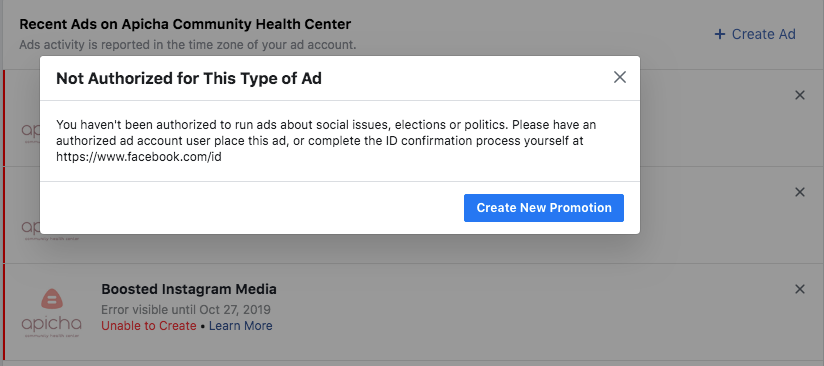Instagram Rejects a PrEP Awareness Campaign; Claims It Contains ‘Politics’
Credit to Author: Harron Walker| Date: Sun, 27 Oct 2019 18:02:10 +0000
In a hearing before the House Financial Services Committee on Wednesday, Facebook co-founder Mark Zuckerberg defended his decision to allow political ads on his platform, even those that contain lies and other misinformation.
“I just think that in a democracy people should be able to see for themselves what politicians are saying, and I think that people should make up their own minds about which candidates are credible and which candidates have the kind of character that they want to see in their elected officials,” he said when pressed by Rep. Alexandria Ocasio-Cortez of New York, per Vox.
This might sound like paid political content has free reign on his platforms, which include Facebook subsidiary Instagram, but Zuckerberg apparently does draw the line somewhere: public health campaigns for queer communities of color. Apicha Community Health Center—a primary care center in New York City that offers a variety of medical services to underserved communities like Asians and Pacific Islanders (API), LGBTQ people, and individuals living with and affected by HIV/AIDS—attempted to run an ad campaign on Instagram promoting public awareness about PrEP, a drug that significantly reduces the risk of HIV transmission, among API men who have sex with men, only to have it rejected on the grounds that the center "hadn't been authorized to run ads about social issues, elections or politics."

“They said the copy was the problem but were unable to tell us what part of the copy was too political,” said Phillip Miner, Apicha's Director of Grants and Communications, in a phone interview with VICE on Friday morning. “It’s incredibly frustrating to encounter these sort of road blocks."
Instagram did not respond to VICE’s request for comment.
Just over a million people are living with HIV in the United States today, according to the CDC, and the annual number of new cases in the U.S. has remained relatively stable since 2012—the same year that the FDA approved Truvada for use as pre-exposure prophylaxis, or PrEP, to reduce the risk of sexually transmitted HIV by 99 percent.
In New York City, the annual number of new cases has dropped by almost 31 percent in that same timeframe. This holds true when broken down by race and ethnicity, with fewer Black, white, and Latinx New Yorkers diagnosed with HIV annually since 2012, but the stats among API residents has stayed relatively the same, hovering between 100 and 150 new cases diagnosed every year.
Apicha CHC hoped to make a dent in those numbers by creating a public education campaign about PrEP that specifically targeted API men who have sex with men, using funding from the New York State Department of Health’s AIDS Institute as part of the Institute’s PrEP Aware initiative. The campaign, which is viewable on the @apichachc Instagram account, features artwork and interviews by queer API artists, who discuss stigma, representation, and their personal histories with taking PrEP. The center didn’t have any problems when uploading the campaign posts to its feed or story, but Instagram rejected its attempt to create an ad campaign, which would have pushed the PrEP Aware content into the feeds and stories of people who don’t follow @apichachc.
This isn’t the first time that a social media platform has rejected one of Apicha CHC’s campaigns, Miner told VICE, though usually the company cites a supposed violation of its adult content policies—the same restrictive policies that have pushed sex workers, artists, and influencers off of these platforms. Twitter initially rejected the center’s PrEP Aware campaign for such reasons, though Apicha CHC was able to successfully appeal the rejection. “Upon further review, we’ve determined that the ad is in compliance [with our Adult Sexual Content policy] and have allowed it to run,” a spokesperson for Twitter told VICE in an email.
That’s how this process usually goes, according to Miner. Apicha CHC submits a campaign, and it gets rejected for being “too sexual.” (“It’s very hard to talk about sex without talking about sex,” Miner noted.) The center then appeals that rejection, and the campaign goes through. It has never had a campaign rejected on the grounds of it being political. Instagram did not clarify what exactly was too political about the PrEP campaign, which features queer API artists talking about their experiences with stigma and discrimination, but did offer a solution: If Apicha CHC could authorize every employee who uses the center’s social media accounts through Facebook, they would be able to run the ad. This would not be possible, Miner told VICE, as one of his staffers, who wished to remain anonymous, uses a name on Facebook that does not match their government ID for undisclosed matters of personal privacy and security.
“Social media platforms are the easiest way for us to reach [the communities we’re trying to reach],” Miner said. “To have social media platforms create these barriers when government entities have given us the resources to reach communities at risk is really hindering the national goal of ending the HIV epidemic.”
Sign up for our newsletter to get the best of VICE delivered to your inbox daily.
Follow Harron Walker on Twitter.
This article originally appeared on VICE US.